How To Keep Snakes Out of Chicken Coop? An In-Depth Guide and Evaluation
- February 9, 2024
- 0 comment
Throughout my time raising chickens, dealing with snakes entering the coop has posed significant challenges. This issue extends beyond merely keeping the chickens safe; it involves ensuring the eggs are not stolen and maintaining my own sense of security. I have experimented with numerous strategies to address this problem, gaining valuable knowledge about effective and ineffective methods.
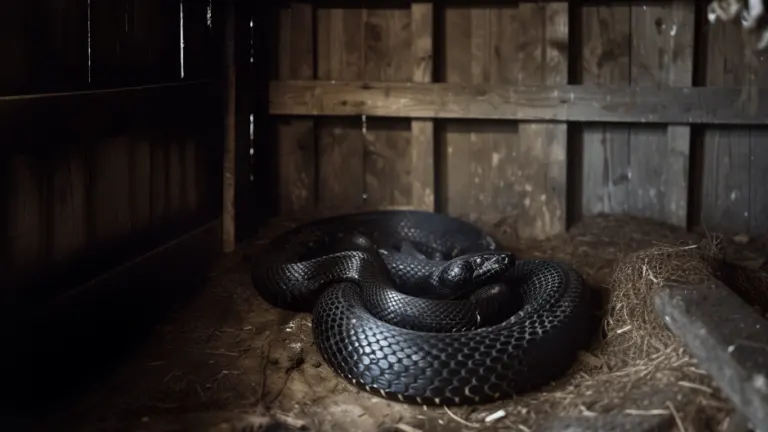
My aim here is to convey what I’ve learned through these trials, offering a detailed analysis of various approaches. This information is intended to assist you in identifying the most suitable solutions for maintaining a snake-free chicken coop based on practical experience and observed outcomes.
List of How To Keep Snakes Out of Chicken Coop:
Understanding the Threat
Understanding the threat snakes pose to chicken coops requires a pragmatic look at the underlying factors drawing them in. Primarily, snakes are attracted to coops in search of food, with chicken eggs and sometimes young chicks serving as appealing meals. However, the attraction doesn’t stop there; coops also provide a secure and warm environment for snakes to take refuge, especially during colder months.
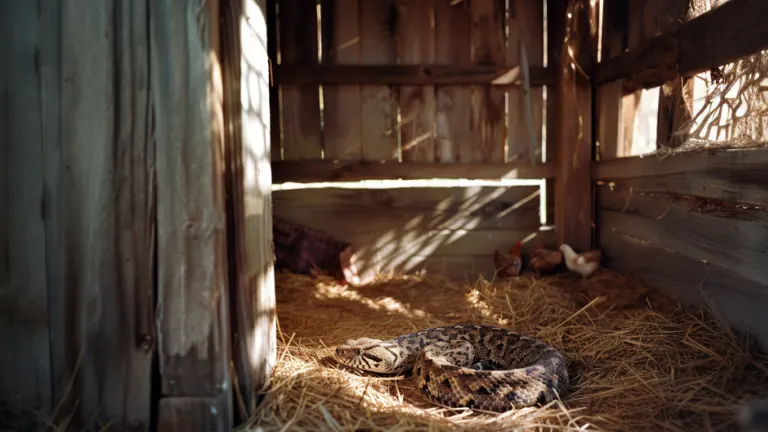
Moreover, chickens can inadvertently lure rodents due to leftover feed or the natural environment of the coop, which, in turn, attract snakes looking for an easy prey. This creates a cycle of predator and prey that, if not managed, can result in snakes becoming recurring, unwelcome visitors to the coop.
Addressing this cycle is crucial in mitigating the snake threat effectively, emphasizing the need for a comprehensive approach that includes securing food sources, fortifying coop defenses, and maintaining a clean and orderly environment to dissuade rodents and, consequently, snakes.
My Initial Reactions
Upon discovering a snake in one of the nesting boxes, my initial reaction was a mix of surprise and concern, quickly shifting to a focus on solutions to prevent future incidents. Recognizing the urgency of the situation, I understood that taking proactive measures was essential to safeguard the coop and its inhabitants.
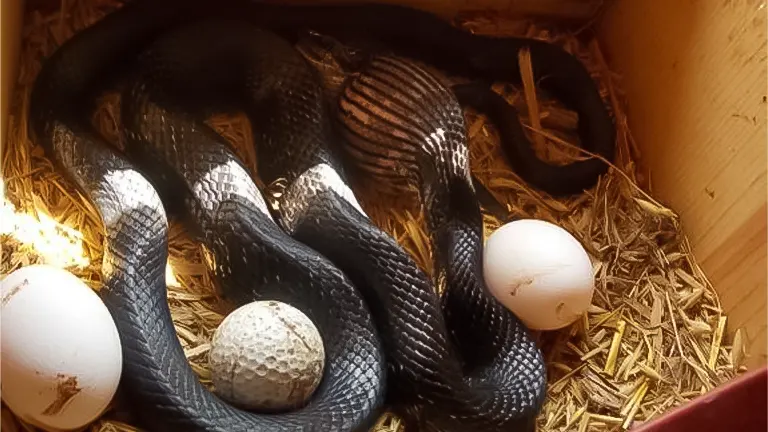
This realization spurred a shift from reactive to strategic thinking, emphasizing the need for a comprehensive approach to deter snakes by addressing potential attractants and securing vulnerabilities within the coop’s structure and surroundings.
The 5 Methods to Prevent Snakes from Entering Chicken Coops
Method 1: Tighten Up Security
Enhancing the security of the chicken coop against snakes begins with a thorough inspection aimed at identifying potential entry points that could be exploited by these reptiles. Recognizing that snakes can navigate through surprisingly small spaces necessitates a meticulous approach to sealing every conceivable gap.
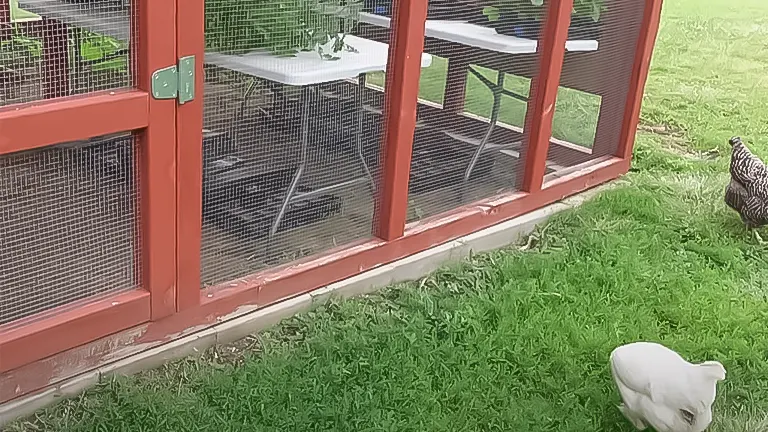
This endeavor involves the strategic use of hardware cloth, a robust and finely woven wire mesh, to reinforce areas vulnerable to intrusion, such as ventilation holes and spaces beneath doors. The choice of hardware cloth over chicken wire is pivotal; its finer mesh effectively obstructs snakes without compromising the coop’s ventilation or accessibility.
The implementation of hardware cloth serves as a physical barrier, significantly reducing the likelihood of snakes gaining entry into the coop. This measure not only enhances the structural integrity of the coop but also provides peace of mind to the chicken keeper.
By addressing these vulnerabilities with precision and using materials specifically suited to deter snake entry, the coop becomes a safer environment for its feathered occupants. Ensuring every nook and cranny is fortified against these unwelcome visitors is a critical step in maintaining a secure and snake-free chicken coop.
Method 2: Egg Management
Addressing the issue of snakes in the chicken coop necessitates a proactive approach to egg management. By increasing the frequency of egg collection, the primary attraction for snakes—the eggs themselves—is significantly reduced.
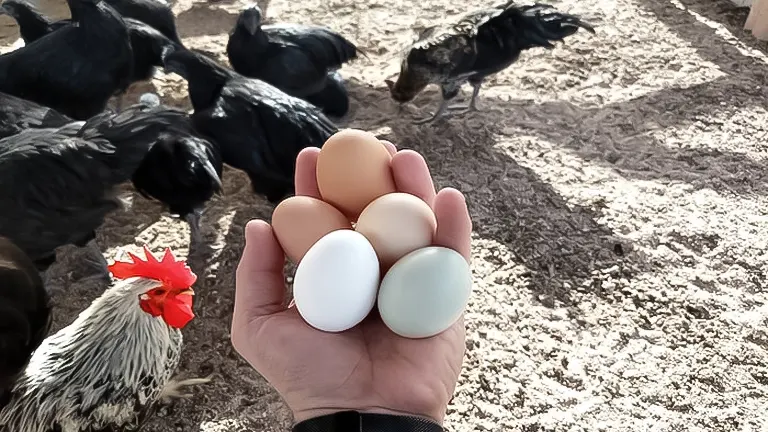
This strategy involves not leaving eggs in the nest overnight, thereby diminishing the incentive for snakes to venture into the coop. Regular egg collection disrupts the food source that snakes are drawn to, effectively making the coop less appealing to them.
Beyond deterring snakes, diligent egg collection has additional benefits for the overall management of the chicken coop. It encourages healthier laying patterns among the chickens, reducing the likelihood of broodiness and ensuring a consistent egg supply.
This approach reflects a holistic understanding of the interconnectedness between egg management and predator deterrence. By removing eggs promptly, the chicken keeper can mitigate the risk of snake encounters while simultaneously fostering a more productive and harmonious coop environment.
Method 3: Rodent Control
The presence of rodents like mice, rats, and chipmunks near your chicken coop is a significant factor in attracting snakes, as these reptiles are drawn to areas with abundant food sources. Ensuring that your coop does not become a haven for rodents is crucial in deterring snakes, which prey on these smaller creatures. To minimize the attraction, it’s essential to store all chicken feed and grains in containers that are secure and resistant to rodent intrusion.
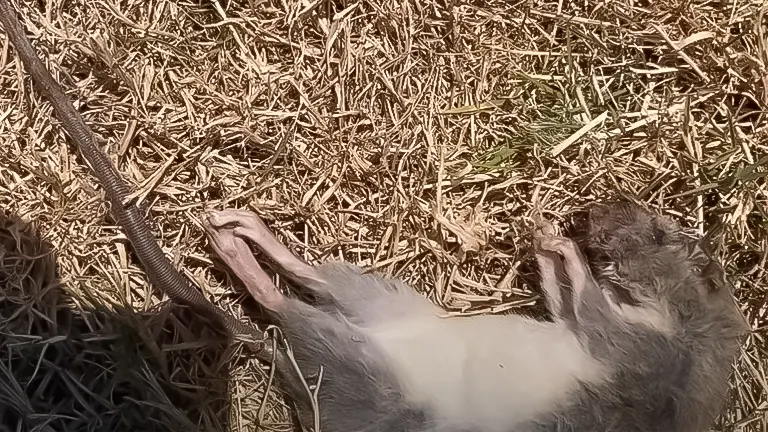
Additionally, consider removing chicken feeders at night or investing in feeder designs that prevent rodent access, thereby cutting off a potential food supply for these pests. If you’re facing a severe rodent issue, emptying water containers overnight and refilling them in the morning can also reduce the resources available to rodents, making your coop less appealing to them and, by extension, to snakes.
Maintaining cleanliness around the chicken coop is another effective strategy for keeping both rodents and snakes at bay. Regularly picking up any leftover feed after your chickens have eaten helps eliminate attractants for rodents, which in turn can decrease the likelihood of snakes frequenting the area.
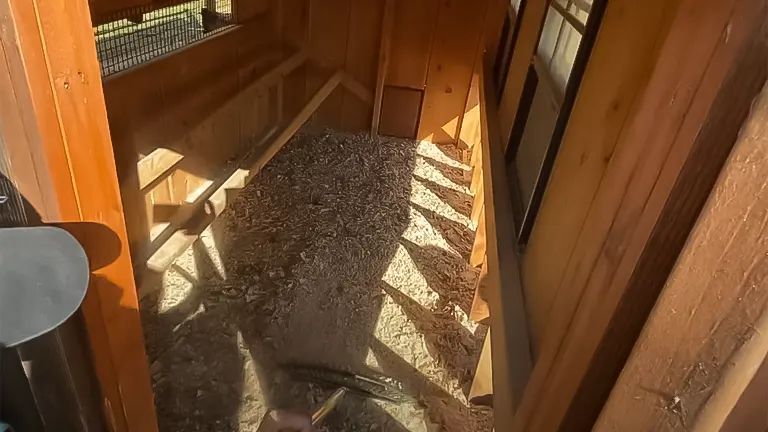
A clean and well-maintained environment around the coop not only discourages rodents from settling in but also reduces the shelter and hiding spots available to snakes. By addressing the root cause of the snake problem—rodent attraction—you can create a less inviting atmosphere for snakes, safeguarding your chickens and their habitat from potential predators.
Method 4: Natural Repellents
The exploration of natural repellents as a method to deter snakes involved integrating marigolds and garlic around the chicken coop, based on anecdotal evidence of their repellent properties. Although the scientific consensus on the effectiveness of these plants as snake deterrents remains unclear, the decision to incorporate them into the garden was made with the intention of adding a potentially protective layer without causing harm.
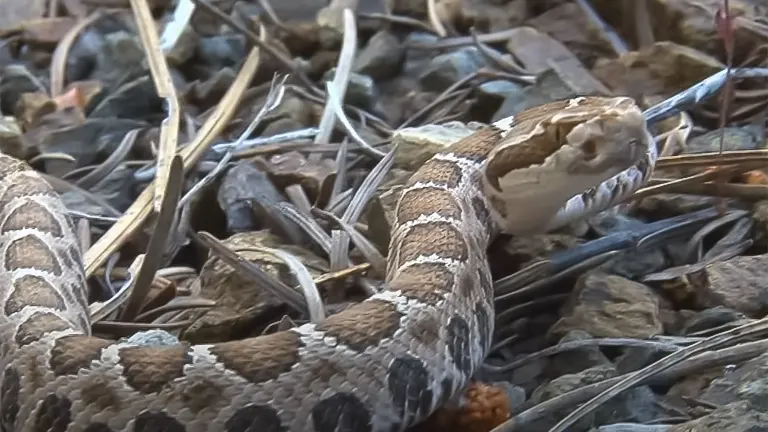
This approach highlights a preference for environmentally friendly and non-invasive deterrent methods that may contribute to deterring snakes while also enhancing the aesthetic and biodiversity of the garden space.
Skepticism regarding the efficacy of natural repellents does not diminish their value as part of a broader strategy to create an unwelcoming environment for snakes. This method represents an attempt to leverage the natural landscape and plant characteristics in a way that might discourage snakes from approaching the coop.
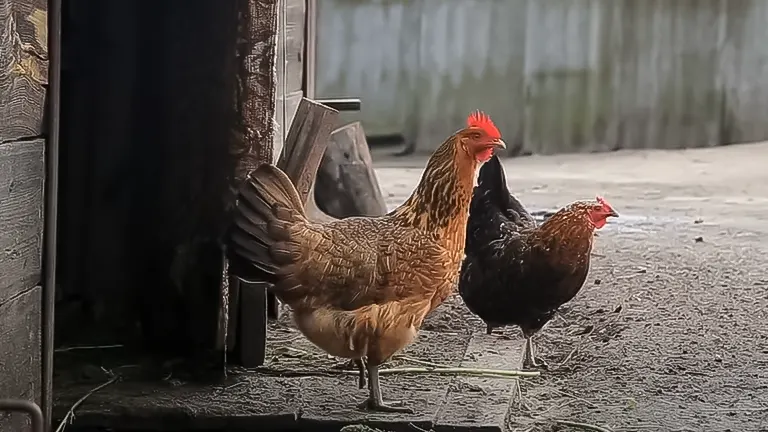
While the impact of marigolds and garlic on snake behavior is subject to debate, their inclusion in the garden serves multiple purposes, offering a benign and holistic approach to snake deterrence that complements more direct preventive measures.
Method 5: Regular Maintenance
The commitment to regular maintenance around the chicken coop is instrumental in deterring snakes. This involves routine actions such as keeping the grass trimmed and removing any potential snake shelters like debris or clutter.
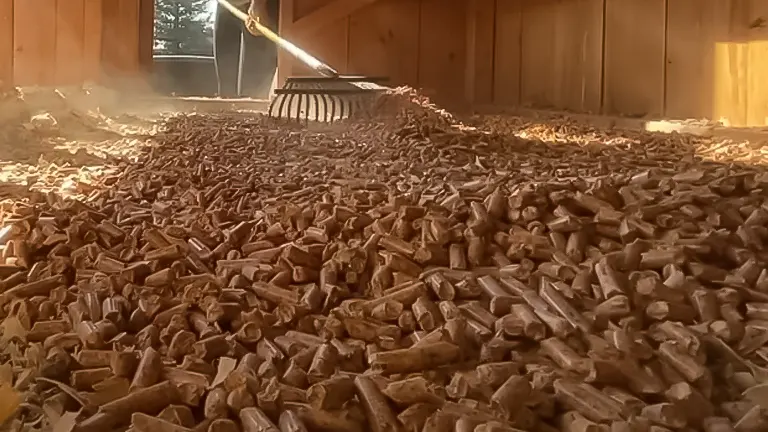
Such maintenance tasks reduce the attractiveness of the area to snakes by eliminating hiding and resting spots. This proactive approach not only targets snakes directly but also addresses the broader ecosystem by reducing rodent populations, which are attracted to unkempt areas and, in turn, attract snakes.
Regular upkeep of the coop’s surroundings plays a crucial role in creating a less inviting environment for snakes. It’s a strategy that goes beyond mere aesthetics, serving as a critical component of predator deterrence.
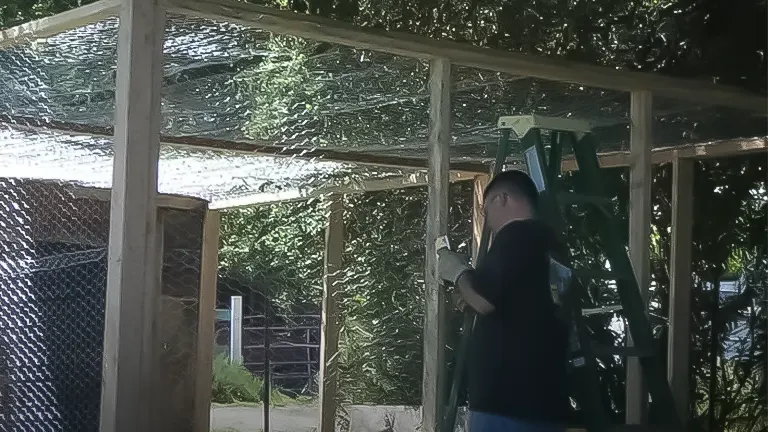
By maintaining a clean and orderly environment, the likelihood of snake encounters is minimized, contributing to the overall safety and well-being of the chicken coop. This level of diligence ensures that the coop remains a
What Can I Put Around My Chicken Coop To Keep Snakes Away?
There isn’t a guaranteed snake repellent or device that can effectively and consistently deter snakes from your chicken coop, despite the claims of various products on the market. While snake traps might offer some deterrent, they often result in the inhumane treatment or death of the snakes, with glue traps being particularly cruel.
Once a snake is caught in a glue trap, it’s nearly impossible to free it without causing harm, leading to the snake’s eventual demise due to exposure or injury. The most effective strategy for keeping snakes at bay involves proactive measures such as securing the coop against predators, maintaining cleanliness, and eliminating rodent populations. These steps create an environment that is less attractive to snakes, reducing the likelihood of their presence near your chickens.
Results Achieved
Several months have passed since the implementation of these measures, leading to a noteworthy reduction in snake incidents within the coop. Although achieving a completely snake-proof environment may be unrealistic, the actions undertaken have clearly contributed to enhancing the safety and security of the coop against snake intrusions.
Related Articles:
- Best Bedding For Chickens
- Best Safe Chicken Coop Heater
- 8×8 Chicken Coop Plans
- Turning a Shed Into a Chicken Coop
- How to Make a Chicken Coop Out of Pallets
- Best Sand for Chicken Coop
- How To Insulate a Chicken Coop
- How To Heat a Chicken Coop
- How To Keep Water from Freezing in Chicken Coop
- How to Build a Chicken Coop
- How To Build Chicken Nesting Boxes
- How to Raise Happy and Healthy Chickens in Your Backyard
- When Can Chicks Go Outside? Timing and Tips for a Smooth Transition
- 12 Reasons why Ducks are Better than Chickens
- Best Automatic Chicken Coop Doors 2024: Expert Reviews & Buyer’s Guide
- Best Fans for Chicken Coop 2024: Effective Cooling Solutions Reviewed
Final Reflections
Managing snakes in a chicken coop is undoubtedly challenging, yet through dedicated effort and careful observation, one can effectively reduce their attraction to the coop. The goal is to establish conditions that deter snakes while maintaining a secure and welcoming space for chickens. By implementing preventative strategies and actively addressing potential risks, I have successfully enhanced the safety of my chickens, leading to greater peace of mind. It’s important to recognize that each coop presents its own set of challenges, necessitating a tailored approach and possibly some experimentation to identify the most effective solutions for your particular circumstances.
Frequently Asked Questions
- What attracts snakes to chicken coops?
Snakes are primarily attracted to chicken coops for food sources like eggs, chicks, and rodents that may be present due to chicken feed. - Can snakes harm my chickens or eggs?
Yes, snakes can eat eggs and smaller or younger chickens. However, most snakes pose no direct threat to adult chickens. - What is the best material to use to prevent snakes from entering the coop?
Hardware cloth with a mesh size of 1/4 inch or smaller is highly effective in preventing snakes from getting through gaps and openings. - How often should I collect eggs to deter snakes?
Collecting eggs at least once a day, preferably twice, can significantly reduce the attraction for snakes. - Are there any natural remedies to keep snakes away from the coop?
While effectiveness varies, some people use marigolds, garlic, or essential oils as natural deterrents, though their success is anecdotal. - How can I rodent-proof my chicken coop to make it less attractive to snakes?
Store feed in secure, rodent-proof containers, clean up spilled feed promptly, and manage waste and clutter to minimize rodent attraction. - Is it necessary to kill snakes found in the coop?
No, it’s not necessary and often not recommended to kill snakes. Relocating them and taking preventive measures is a more humane and effective approach. - How do I check my coop for potential snake entry points?
Inspect the coop thoroughly for any cracks, holes, or gaps, especially near the base, doors, and windows. Pay special attention to vent openings and fix any damages with hardware cloth. - Can lighting or sound devices deter snakes from coming near the coop?
There’s little evidence to support that lighting or sound devices effectively deter snakes. Physical barriers and cleanliness are more reliable. - What should I do if I find a snake in my chicken coop?
Remain calm and try to identify the snake from a safe distance to ensure it’s not venomous. If possible, gently guide it out of the coop using a long tool or call a professional for removal.
We value your input! If you’ve implemented strategies or have experiences in deterring snakes from your chicken coop, we invite you to share your knowledge in the comments section below. Your firsthand tips and observations could be incredibly beneficial to other poultry enthusiasts looking to protect their coops. Together, let’s assist one another in developing efficient approaches to prevent snake encounters!

Edward Smith
Forestry AuthorWoodworking is about more than crafting; it's a harmonious connection with nature, mastering tools, and preserving our environment. I'm here to share my knowledge and experiences with you, forging a future where we can embrace wood's beauty and utility while safeguarding our forests' health and diversity.






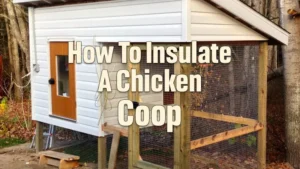

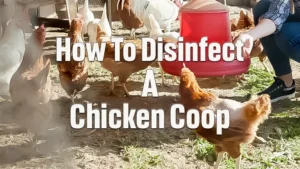
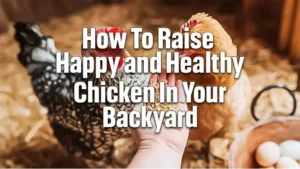
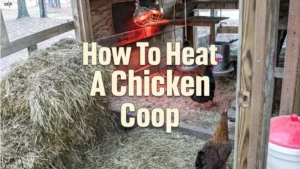

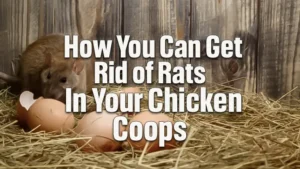
Leave your comment